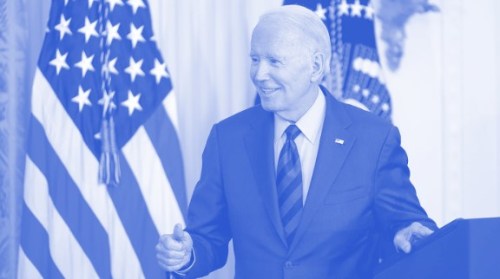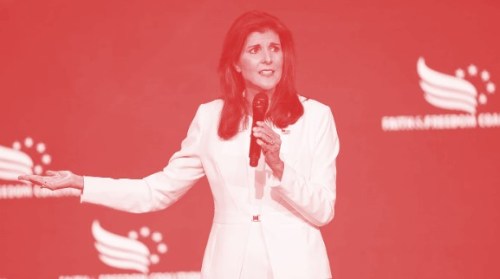Haley faces barrage of sexist attacks
Nikki Haley is facing a barrage of sexist attacks in her bid to become the GOP nominee for president, underscoring the hurdles women face when running for the highest office in the country.
The 51-year-old former United Nations ambassador is experiencing surging momentum as the Iowa caucuses and New Hampshire primary near, tailoring her pitch around her credentials to beat President Biden.
But the gendered attacks from her male opponents also raise the question of how they might impact her standing before voting begins in the critical early primary states.
“There’s no winning, no matter what approach she chooses,” said Jennifer Horn, a former New Hampshire GOP chairwoman. “Whether she decides to ignore it and continue to just advance her message or to stand up and push back strongly, it’s a lose lose.”
“When a woman tries to push back hard,” Horn added, “she’s perceived as whining and complaining.”
Haley, who is still polling behind former President Trump, has nonetheless risen among other rivals after she used several strong televised debate performances to position herself as a viable alternative to the 45th president. On the national stage, she came out strongly against Vivek Ramaswamy, a biotech executive who has repeatedly used gender-based critiques against her.
During an especially heated Republican debate in Miami, Ramaswamy labeled the former South Carolina governor, who is hawkish on foreign policy, as “Dick Cheney in three-inch heels.”
References to women’s shoes are seen by some observers as sexist fodder often used by male candidates as a way to suggest their female counterparts are consumed with appearances. Haley, who has shown a quick wit against her male rivals, took on Ramaswamy over his slight.
“I’d first like to say, they’re five-inch heels,” she retorted, adding, “I don’t wear them unless you can run in them.” Her answer also suggested a preparedness to move quickly as commander in chief. In case that wasn’t explicitly clear, Haley went a step further by denouncing any insinuation that she’s frivolous. “I wear heels, they’re not for a fashion statement, they’re for ammunition,” she said.
The sexist attacks have only escalated with polls showing Haley gaining ground on her party’s male opponents. One poll in particular garnered attention from New Hampshire voters after she won the coveted endorsement of the state’s popular GOP governor, Chris Sununu.
The survey by CBS News shows her closing in on Trump and outpacing him as more “likable,” a historically tough metric for female candidates to overcome. She’s also seen as the most “reasonable,” according to the survey, and is just 1 point below Trump in preparedness for higher office, earning 53 percent to his 54 percent.
Trump sought to paint Hillary Clinton as highly unlikable in 2016, seizing on a public sentiment that dogged her campaign. While it’s not yet clear if he will take that same approach through Haley’s ascent, her other opponents and their allies have already embraced sexism as a tool against her candidacy.
“She’s in a particularly difficult situation because she’s running against some men who are widely, openly, publicly sexist in Donald Trump and Vivek Ramaswamy,” Horn said. “If she can find a way to message that highlights just how aged and out of touch these attacks are, rather than taking them on personally, she should take them on as a crusade for women.”
So far, Haley has been reluctant to do that. While she’s fired back at Ramaswamy and even outside figures in the media such as Don Lemon, the former CNN anchor who suggested early in the race that women of Haley’s age were past their “prime,” she hasn’t made the explicit plea to Americans to vote on the basis of her sex.
Instead, she’s made more lighthearted remarks, like referring to herself as a “badass woman” in front of a crowd of Keene, N.H., residents. At the most recent debate in Alabama, she joked, “I love all the attention, fellas,” amid a flurry of attacks from her male rivals.
“I do not believe she needs to lean into the first female president angle more,” said Rina Shah, a Republican operative. “That would make her seem as if she’s putting identity ahead of qualifications. That’s something her political ideology doesn’t jive with nor ever has. She can speak to the positive aspects of being a mom, military spouse, daughter of immigrants but doesn’t need to overtly come out making the case for herself to be the first female POTUS.”
Republican strategists like Shah say that Haley’s political maneuvers so far have already outshined her opponents, and she should continue to lean into that strategy.
“At this point in the race, there is a real and palatable jealousy in the GOP primary candidate field for the financial support and boost in the polls that Nikki Haley has earned after her performances at the first three debates in particular,” Shah said.
“Particularly, within the GOP, there hasn’t been buzz about how a woman’s right for the job nor any buzz about her being the right woman for the times or the job,” she said, “until she proved to be aggressive and relentless on the debate stage. Those who diminished her candidacy before it took off, on the basis of merit, was a sexist way of looking at her place in the race.”
Ramaswamy is not the only Republican making negative comments about her gender. Fight Right, a leading super PAC boosting Florida Gov. Ron DeSantis, her closest rival other than Trump, has tried to pin Haley to the unpopularity of Hillary Clinton’s brand among the voters she needs to win, hoping to portray her as equally unfit.
“We know her as Crooked Hillary, but to Nikki Haley, she’s her role model, the reason she ran for office,” a narrator said in an ad run by the PAC, which showed composite images of Haley and Clinton together. That came after the 39-year-old Ramaswamy accused her of using “identity politics” to gain an edge — one of the most common criticisms levied against Clinton.
“There is irony in the case against Ambassador Nikki Haley that women aren’t ‘tough enough’ for the role of president,” said Emily Matthews, an independent political strategist focused on the 2024 election.
“If we’re going to apply old stereotypes to the reasoning, she is, in fact, tougher than most of her counterparts,” she said.
Women in politics have long lamented the double standard between how they are judged and how men competing for the same positions are often perceived. The 2020 presidential cycle offered a vast slate of female candidates who all criticized elements of sexism throughout their bids, with Vice President Harris arguably facing the biggest onslaught of targeted attacks over not only her gender but also her race as a Black and Indian American woman.
Haley, who is also Indian American, would offer the chance of victory for many longing to see a woman win the White House.
“It’s very difficult to convince people to vote for you just because you’re a woman. The idea that it’s time for a woman? Sure. But are you the right woman?” Horn said. “For Nikki Haley, she has to be able to make the argument that she’s the right person for this job.”
On Monday, Rep. Thomas Massie (R-Ky.) called Haley a “brunette Liz Cheney” in an attempt to knock her down in stature. “She hates free speech as much as she loves war and foreign aid,” Massie wrote in a post on X, the platform formerly known as Twitter.
Defenders see the jabs not only as unjust but as proof that shows she is being battle tested beyond other contenders, a pitch that she can take to voters on top of her resume.
“In addition to serving in incredibly consequential, high-pressure roles, Ambassador Haley also has to regularly combat the typical sexism and inferiority complexes that are far too present in this industry,” Matthews said. “To top it off, she does it with a lot of grit and somehow, grace.”
Copyright 2023 Nexstar Media Inc. All rights reserved. This material may not be published, broadcast, rewritten, or redistributed.





